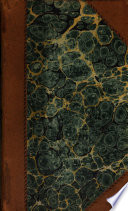 | Isaac Newton - Light - 1730 - 403 pages
...Force by which Bodies tend towards one another, whatfoever be the Caufe. For we muft learn from the Phenomena of Nature what Bodies attract one another, and what are the Laws and Properties of the Attraction, before we- enquire the Caufe by which the Attraction is" performed. The Attractions of... | |
 | Felix O'Gallagher - Astronomy - 1784 - 420 pages
...bodies " tend towards one another, whatever be " the cp.ufe ; for we muft learn from the phse" nomena of nature, what bodies attract " one another, and what are the laws and " properties of attraction, before we enquire " the caufe by which the attraction is per" formed." Hence it appears... | |
 | Daniel Ellis - 1811 - 396 pages
...force by which bodies tend towards one another, whatsoever be the cause. For we must learn, from the phenomena of nature, what bodies attract one another, and what are the laws and properties of the attraction, before WQ inquire the cause by which the attraction is performed. The attractions of gravity,... | |
 | Abraham John Valpy - Great Britain - 1818 - 576 pages
...any force by which bodies tend towards one another, whatever be the cause. For we must learn from the phenomena of nature what bodies attract one another, and what are the laws and properties of the attraction, before we inquire the cause by which the attraction is per-! formed.'" How immense and... | |
 | 1841 - 488 pages
...force by which bodies tend toward* one another, whatever be the cause ; for we must learn from the phenomena of nature what bodies attract one another, and what are the laws and properties of the attraction, before we inquire the cause by which the attraction is performed.' bodies, conform to the... | |
 | Encyclopedias and dictionaries - 1824 - 884 pages
...force by which bodies tend towards one another, whatsoever be the cause. For we must learn from the phenomena of nature what bodies attract one another, and what are the laws and properties of the attraction, before we inquire the cause by which the attraction is performed. The attraction of gravity,... | |
 | Ida Freund - Chemical structure - 1904 - 682 pages
...which bodies tend towards one another, whatsoever be the cause. For we must learn from the phaenomeua of nature what bodies attract one another, and what are the laws and properties of the attraction, before we enquire the cause by which the attraction is perform'd. The attractions of gravity,... | |
 | Chemistry - 1906 - 446 pages
...force by which bodies tend towards one another, whatsoever be the cause. For we must learn from the phenomena of Nature, what bodies attract one another, and what are the laws and properties of the attraction, before we inquire the cause by which the attraction is performed. The attractions of gravity,... | |
 | Matthew Moncrieff Pattison Muir - Chemistry - 1906 - 610 pages
...Force by which bodies tend towards one another, whatsoever be the Cause. For we must learn from the Phenomena of Nature what Bodies attract one another, and what are the Laws and Properties of the Attraction, before we enquire the Cause by which the Attraction is perform'd. The Attractions of Gravity,... | |
 | Paul Menzer - Cosmogony - 1911 - 448 pages
...which bodies tend towards one another, whatsoever be the cause. For we must learn, from the phaenomena of Nature, what bodies attract one another, and what are the laws and properties of the attraction, betore we enquire the cause by which the attraction is performed" M). Damit sind wir der... | |
| |